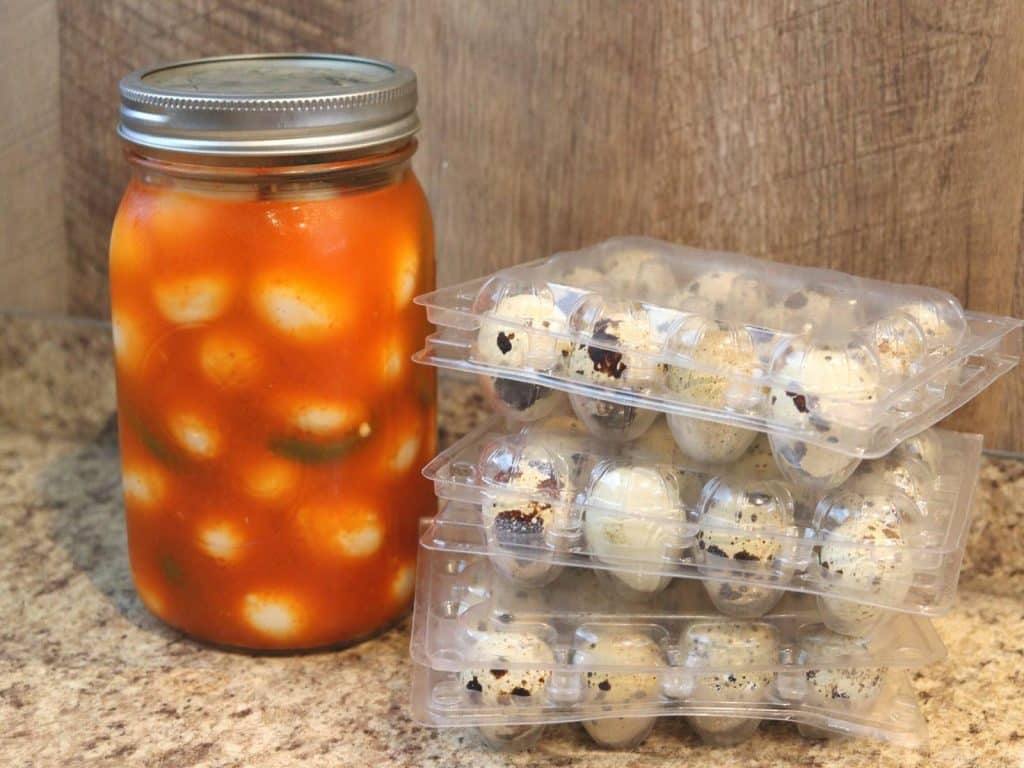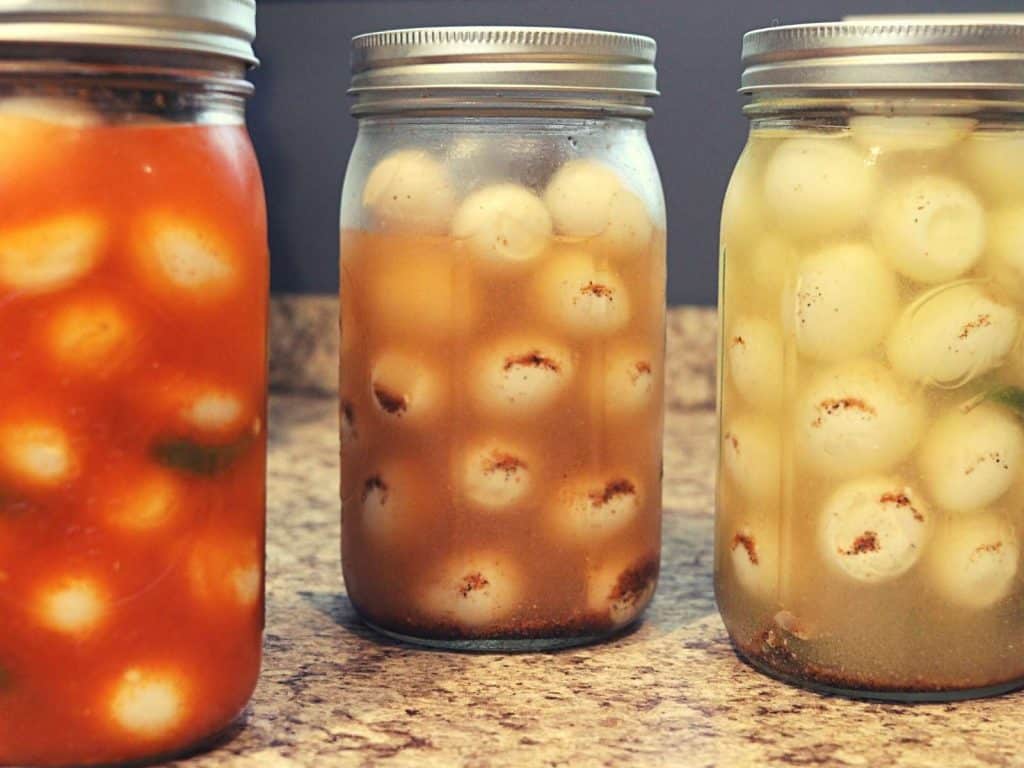Hot & Spicy Pickled Quail Eggs Recipe
These eggs are soaked in a brine made with jalapeno peppers, garlic, and Cholula hot sauce. These eggs are HOT and perfect for snacking!

Recently, more and more people have started raising quail and chickens at home. Which means more and more people are left wondering what in the world are they supposed to do with all these extra eggs!
One of the ways to preserve those eggs is to pickle them. Pickling eggs is a method of home food preservation that has been around for a very long time (back to the mid 1700’s).
I particularly love spicy pickled quail eggs. They make a delicious snack or quick protein option for lunch. We always have 4-5 jars of pickled eggs sitting in the fridge, ready to go.
Affiliate Disclosure: This post may contain affiliate links. As an Amazon Associate, this means I will earn a small commission if you choose to purchase through my links. This is at no extra cost to you!
Ingredients for Spicy Quail Eggs
- Cholula Hot Sauce (or any hot sauce you prefer).
- 5% Acidity White Vinegar
- Water
- 1-2 Large Jalapenos
- 4-5 Cloves of Garlic
- Canning Salt
- 3 Dozen Fresh Quail Eggs
Step One
First things first – you need to hard boil and peel your quail eggs. This can be done by bringing you water to a boil in saucepan and lowering your eggs gently into the boiling water. Allow them to cook for 4 minutes. Remove from the boiling water and place in an ice water bath or rinse with cold water until cool.
If you need further details on the best way to boil and peel your eggs – check out this detailed post on Perfect Boiled and Peeling Quail Eggs.

Step Two
Now that your eggs are ready to go, you can start working on your brine (AKA pickling solution).
In a medium saucepan, add 1 cup of water, 1 cup of vinegar, 1/2 cup of Cholula hot sauce, and 1 tablespoon pickling salt. Bring this mixture to a boil over medium heat. Reduce to a simmer for 5 minutes.
Step Three
Next, wash and slice your jalapeno pepper. You can leave the seeds or wash them out. I choose to leave the seeds in mine (the jalapenos are actually really good after soaking in the brine as well). Peel your garlic cloves but leave them whole.
Step Four
Now, in a clean glass jar (quart size), start to place eggs one layer at a time. If you have them, use a wide mouth mason jar – they are easier to get the eggs in and out of. I typically place 6-8 eggs, then do a bed of jalapenos and garlic clove, and repeat until all eggs are in the jar.
Take your pickling liquid and pour it over your eggs. It is usually best to pour the brine in while it is still hot verses room temperature. You will find that your egg whites are not as tough this way. Use caution while handling hot liquids.
Ensure that all eggs are covered with the liquid. Place lids on your canning jars and store in the fridge (instead of wasting your canning lids, check out these reusable plastic lids for mason jars). It can take anywhere from 5-10 days before the eggs really start to soak up the flavor.
Shop this post!
Looking for some of the items shown in this post?
Looking for more egg recipes? Check out these posts!
Easy Spicy Pickled Quail Egg Recipe for Beginners
Easy Recipe for Pickled Eggs in Dill Pickle Brine
10 Easy Recipes for Pickled Eggs without Pickling Spice

Hot & Spicy Pickled Eggs
Equipment
- quart sized glass jar with lid
Ingredients
For the Brine
- 1 cup water
- 1 cup 5% white vinegar
- 1/2 cup Cholula hot sauce
- 1 tbls pickling salt
- 3 dozed quail eggs hard boiled and peeled
- 1-2 jalapeno pappers sliced
- 5-6 garlic cloves peeled
Instructions
- In a medium saucepan, combine 1 cup water, 1 cup 5% vinegar, 1/2 cup hot sauce, and pickling salt. Bring to boil and continue cooking for 5 minutes. Remove from heat.
- In a quart size mason jar, place a single layer of boiled and peeled eggs followed by a few slices of jalapeno peppers and a clove of peeled garlic. Continue placing layers until the jar is full.
- Take your brine and pour it in to the jar with the eggs, working carefully as the liquid is still hot. The eggs should be completely submerged in the brine.
- Place an airtight lid on the jar and store in the fridge. Eggs will take 5-10 days to soak up the brine, with the flavor increasing over time.
Notes
- Sub out 1 dozen small/medium fresh chicken eggs for quail eggs.
- Eggs purchased from the grocery store should not be used in this method of home food preservation.
- Eggs should be stored in fridge at all times.
- Use eggs within 3-4 months for best quality.
How do I store my pickled eggs?
The recommended way to store pickled eggs is in your fridge for up to 3-4 months. There is currently no recommended process for water bath canning or pressure canning pickled eggs at home.
Can I pickle grocery store eggs?
When pickling eggs for food preservation purposes, you need to use fresh eggs, ideally no more than a few days old. This means that grocery store eggs are probably out of the question since they are far more than a few days old.
You will either need to gather your own fresh yard eggs or find a local farmer who sells fresh eggs.
What size eggs should I pickle?
In general, the smaller the better. That is because smaller eggs take less time to soak up the flavor from your brine. Try using quail eggs or small to medium chicken eggs for pickling.
Should I use apple cider vinegar or white vinegar to pickle eggs?
Yes, you can swap you white vinegar for apple cider vinegar, but the apple cider vinegar will probably change up the flavor of the brine. So just keep that part in mind when/if you swap.
I’ve only used white vinegar in this recipe, so if you try the ACV, let me know!
Can I pickle chicken eggs?
Absolutely! You can replace the 3 dozen quail eggs listed in this recipe with about 1 dozen medium sized chicken eggs.
Can I use regular table salt in place of pickling/canning salt.
Using the correct salt when preserving food is important for the growth of good bacteria, and to keep bad bacteria from growing. Most table salts include additives to them, such as anti-caking agents, while pickling salt is pure sodium chloride.
For this reason, I only recommend using a true pickling/canning salt in this recipe.
